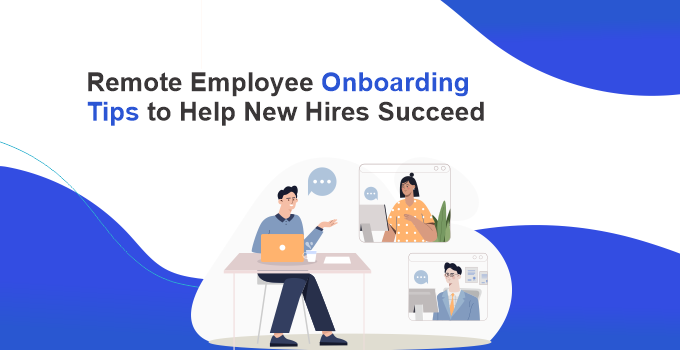10 Remote Employee Onboarding Tips to Help New Hires Succeed
- 10 Remote Employee Onboarding Tips
- 1.Define and Communicate Expectations
- 2.Explain the Rules and Policies
- 3.Communicate Effectively
- 4.Implement Training Programs
- 5.Remote Employees' Feedback Questionnaire
- 6.Give Them a Sense of Ownership
- 7.Welcome Packages Sent through Snail Mail
- 8.Pick the Right Software For Your Needs
- 9.Work on Creating a Cohesive Team
- 10.Maintain a Professional Attitude and Make Time to Socialize with One Another
- Final Thoughts
The advantages of a remote workforce are well-known. This approach enables businesses to recruit people from all over the globe for a fraction of the price of conventional office space. Handling a remote workforce, on the other hand, has its own set of challenges, especially during employee onboarding.
The goal of any company that has remote employees is to be successful in making it easy for new hires to reach the finish line and become hard-working professionals who will not only get the job done but will also be happy to work according to the company’s values and goals. Here are some remote employee onboarding tips that can help them thrive in your company.
10 Remote Employee Onboarding Tips
Onboarding is when new employees are eased into their positions with an introduction to the company, training, forms, policies, and benefits. It’s important to remember that onboarding is very different for someone who works remotely than for someone who works in an office. Employee onboarding is proven to help companies retain employees, so it’s worth investing time and energy into being as successful as possible.
1.Define and Communicate Expectations
How to communicate expectations depends on the role of the individual being onboarded. First, make sure your remote employees understand what is expected of them in the role. This includes goals, timelines, and workflows. In addition, make sure you communicate clearly how their contributions fit into the overall strategy of the company and its ultimate goals.
Workers who work from home should have access to resources and equipment that will help them succeed. This includes everything from access to training and mentoring resources to an employee handbook that outlines company policies and benefits.
Click here to read: Guide to Hiring Employees
2.Explain the Rules and Policies
If you hire remote workers, you need to onboard them effectively. They must grasp your company’s policies and procedures.
When you hire a new employee, he or she must understand the company’s policies and rules. If they don’t, there’s a good chance they’ll violate them and cause problems for themselves and your company. Your new employees must know what the office culture is like and what kind of behavior is expected of them. You also want to make sure they know what the company’s expectations are in terms of work hours.
Explain your company policies as thoroughly as possible. Some companies have a lengthy employee handbook that covers all aspects of employment – from vacation time to dress code – so new employees can easily reference it later if they have a question about something. If your company doesn’t have a written employee handbook, explain your policies verbally during your first few meetings with a new worker. This will help him understand how his job functions within the larger scope of the company’s operations.
3.Communicate Effectively
Communication is one of the most important skills for a remote employee to have, and it’s a skill that can be learned. It’s also a talent that may be honed via repetition. Putting yourself in circumstances where you’re compelled to speak to others is the key to developing your communication abilities.
It may be difficult to communicate with your colleagues regularly if you operate remotely. But if you make it a priority, you’ll develop stronger relationships and create a better working environment for all involved. Here’s how:
- Get Everyone’s Contact Information
First, find out how to reach your team members by phone and email. If most of your employees work remotely, consider setting up a video chat tool – like Skype – so that everyone can have regular virtual conversations.
- Set up Regular Check-Ins
Set up a recurring meeting with your coworkers so that you can touch base with everyone on your team at least once a week. It doesn’t have to belong – just 15 minutes is enough – but it should be consistent. If you encourage your team members to share their information, you’ll be able to discover more about them and guide them accordingly.
Click here to read: 10 Ways To Attract Young Talent To Your Company
4.Implement Training Programs
Like most professionals, you spend a lot of time thinking about how you’ll find and hire the right people to join your team. All of that effort is worthwhile and necessary, but when your new employees finally hit the ground running, they aren’t going to magically become productive with no additional support. They need a lot more help than you think.
Establishing a training system is one of the most important things a business can do for its employees. Training enables people to be more productive, which mean everyone benefits from a well-designed and executed training program.
5.Remote Employees’ Feedback Questionnaire
Remote Employees’ Feedback Questionnaire is a great tip for Remote Employee Onboarding to Help New Hires Succeed. It makes workers feel like they’re a member of the team and that they’re contributing to the success of the company. This will help make them more motivated and help them work even harder for you and your company.
Although in-person performance evaluations are effective when done correctly, it is also true that they take time and effort. Remote workers are becoming increasingly prevalent as the modern workforce demands more flexibility.
Employee onboarding is a chance for the employee and management to establish a good working relationship. When onboarding the remote employees, managers need to be extra diligent during this process as there are fewer opportunities for direct interaction with the new hire.
6.Give Them a Sense of Ownership
A lot of people think that giving employees a sense of ownership means giving them more control and freedom. Those things can indeed help, but what matters is making the new hire feel like they’re part of the team and that they have something invested in the company’s success. They must believe that they are not simply employees, but also owners.
Continue to offer them chances to make choices and take action on their own once you’ve brought them on board. For example, have those present new ideas or talk with customers about problems they are having with your product. You can even have them brainstorm solutions for problems that don’t exist yet but will soon if left unchecked. Doing this will give the new hire a sense of ownership over their new position at your company.
Click here to read: How to Develop an Effective Business Intelligence Strategy?
7.Welcome Packages Sent through Snail Mail
Welcome packages sent through snail mail are a great tip is a great way to welcome employees. A welcome package not only gives people something to look forward to when they’re stuck at home all day with nothing else to do, but it also gives them an introduction to the company they’re about to join. This is especially helpful when the new employee is in a different location from everyone else, where they won’t have the chance to learn anything in person.
Your welcome package can be a reflection of your company’s culture. If you want people to feel successful when they join your company, make sure the items in your welcome package are useful and engaging.
8.Pick the Right Software For Your Needs
This is a great tip that helps both the employer and employee during onboarding. Employees will be permitted to use all office supplies during working hours. However, these tools will take time to learn and may even be overwhelming. The best way for a new hire to make a positive impression on a company is to get down to business and start producing work quickly.
The key is for the employee to learn all of these software programs at their own pace. If they are required to use multiple programs from day one, they will be overwhelmed and potentially lose focus, making them less productive in the long run.
If you can focus on using one program well, then adding another when you feel ready, you will become more productive faster. Just remember that while this concept may seem counter-intuitive to some employees, it will help ensure that your productivity does not suffer while you learn all of these programs at once.
9.Work on Creating a Cohesive Team
The goal of employee onboarding is to get new hires up to speed as quickly as possible, but that means doing more than just training. Onboarding is all about helping new hires is successful in their new roles, and for remote employees, that means creating a cohesive team.
Team acceptance has been shown to increase productivity, engagement, and retention. So if your company hires remote workers, take the time to create a cohesive team out of people who may never have seen each other in person.
When you design the orientation program for new staff, it’s important to consider how many people will be in the group and what your goals are. Some companies have formalized processes with checklists while others have less structured onboarding programs that are still effective in creating a cohesive team.
Click here to read: How to Win New Clients and Prospects with Seminars and Webinars
10.Maintain a Professional Attitude and Make Time to Socialize with One Another
What we mean by professionalism is not what you do on the job. It’s something you do while you’re not working. And that includes getting to know one another as people more than just as coworkers.
Much of your professional life will be spent with those who are not your direct reports or peers. And those relationships, the ones where it’s helpful and necessary to know more than just each other’s work styles and capabilities, can make a big difference—in how well each of you does your work and how much you enjoy doing it.
Final Thoughts
Remote employee onboarding is more than just a fancy name for getting new hires up to speed. It’s an essential part of your business strategy to help you hire the right people, keep them engaged, and keep your business growing.
There are some obvious reasons why you might choose to use remote employees in your company — it might be because you’re hiring overseas or because you want to hire someone who doesn’t live near where you do. However, there are also less apparent reasons why employing remote workers may help your business thrive. Here are five great advantages of hiring remote workers:
- They can work in any time zone
- They can work in any location with an internet connection
- Access to a larger talent pool
- You’ll save on overhead costs by not having an office space for them
- You have the added benefit of being able to hire the best person for the job rather than just the person who lives closest to your office
The growing trend of hiring remote employees has made it necessary for companies to create strategies for remote employee onboarding. Onboarding is an essential part of a new employee’s induction period.



